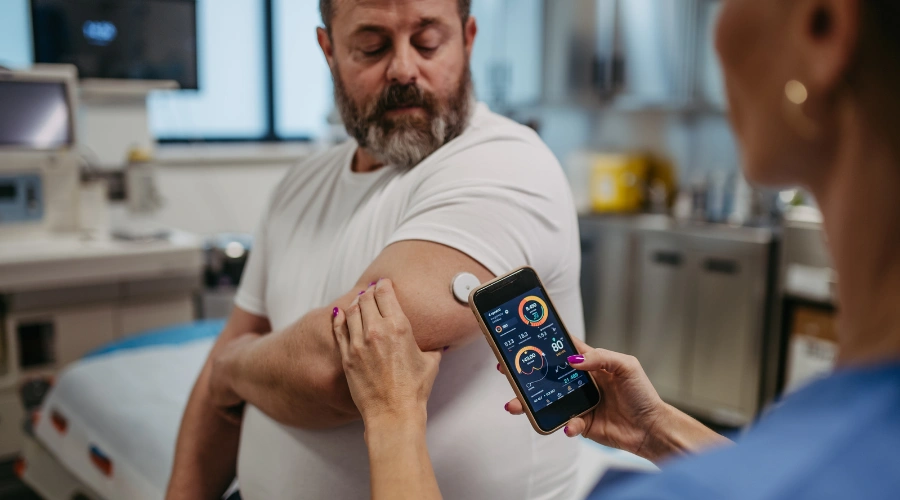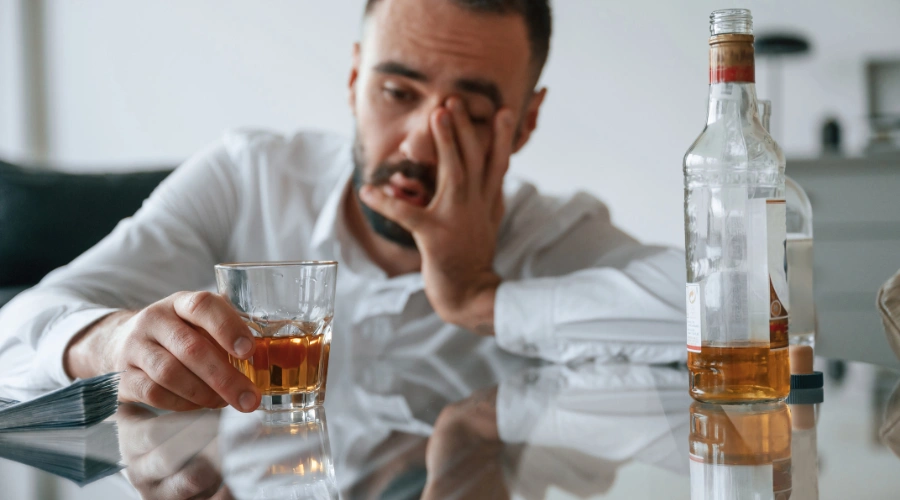Understanding The Risk Factors of Excessive Alcohol Intake
Alcohol is one of the most widely used drugs. While heavy drinking and binge drinking are normalized frequently, the truth is that alcohol is a dangerous substance. This is true for more than one reason.
Notably, excessive alcohol consumption can raise the risk of many health complications. With this in mind, you might wonder: Does alcohol cause diabetes? There is a connection.
Multiple risk factors can contribute to the chances that a person will develop diabetes mellitus, from family history to certain medical conditions. South Shores Detox and Recovery is here to help people like you overcome alcohol abuse and its effects.
Let’s explore the effects of alcohol on diabetes risk. We will also talk about how alcohol can influence diabetes care in those who already have the condition and how treatment can help.
Does Alcohol Abuse Cause Diabetes?
Alcohol abuse does not cause diabetes directly. However, it can influence your risk of the condition. Specifically, research shows that those who engage in excessive alcohol consumption are at a significantly increased risk of developing diabetes.
There are multiple connections between chronic alcohol consumption and diabetes risk, including:
Problems With Glucose Regulation
Alcohol can interfere with how the body uses glucose (sugar). Insulin is a hormone responsible for regulating blood sugar levels. Insulin resistance is a condition where your body’s cells become less sensitive (less likely to react) to insulin. Insulin resistance and impaired glucose tolerance are connected to excessive alcohol use.
Impaired Liver Function
Heavy drinking increases your risk of fatty liver disease. Research shows that those with fatty liver disease who drink heavily have an elevated risk of type II diabetes. However, even moderate alcohol consumption without the presence of fatty liver disease is connected to a greater chance of developing incident type II diabetes.
Excessive Sugar in Alcoholic Drinks
Similar to alcohol, sugar doesn’t cause diabetes directly. That said, excess sugar consumption can increase your risk of developing diabetes. When you eat or drink a lot of sugar on a prolonged basis, it can strain the pancreas. This may lead to impaired insulin secretion.
Many popular alcoholic drinks are high in sugar. If you drink alcohol often, this could mean that you’re consuming more added sugar than you realize.
How Alcohol Affects Diabetes Management
If you’ve already been diagnosed with diabetes mellitus, alcohol can affect your ability to manage it. Here are some considerations to keep in mind.
Alcohol Use and Diabetes Medication
Alcohol can interfere with some diabetes medications. This may lead to blood sugar levels that are too low or too high. If you drink, it’s important to talk with your doctor about how alcohol could affect any medications you take. That way, they can go over the risks with you.
Conflict With Diabetes-Related Complications
Some of the complications associated with diabetes can make drinking alcohol even more risky. For example, if you have nerve damage or kidney disease, medical providers may recommend that you don’t drink. Untreated alcohol addiction can make it difficult to follow these recommendations.
Trouble Recognizing Symptoms of Low Blood Sugar
Drinking can make it more difficult to recognize symptoms of low blood sugar, which could mean that dangerously low blood sugar levels go unaddressed. For example, if you pass out from low blood sugar, others may believe that you are drunk.
Other Risks of Heavy Alcohol Consumption
The connection between alcohol and diabetes is just one example of how alcoholism can affect your overall health. Other possible negative effects of heavy alcohol consumption include but aren’t limited to:
- A greater likelihood of serious cardiovascular incidents. A study on 3,108 participants found that women who engage in binge drinking have a 68% higher risk of heart disease compared to women who drink moderately. Men with a high overall intake were 33% more likely to develop heart disease compared to those with a lower intake.
- Toxicity is always a risk for people who drink or use other substances. Mixing alcohol with other drugs, whether they are certain prescription medications or illegal substances, can raise your risk of overdose.
- An increased likelihood of some cancer types. Heavy alcohol use is correlated with higher rates of some forms of cancer, such as breast, colon, mouth, throat, and liver cancer.
- A heightened chance of accidents and injuries. Statistically, alcohol use increases your risk of falls, motor vehicle crashes, and other events resulting in physical injuries.
- Brain changes. Alcohol can cause brain changes affecting speech, mood, memory, coordination, and judgment.
- Chronic pancreatitis. Like other body organs, heavy alcohol use strains the pancreas. In addition to increasing your diabetes risk, chronic pancreatitis can raise your chances of developing pancreatic cancer. The most common symptom of pancreatitis is abdominal pain.
What is heavy alcohol consumption, exactly? For women, four or more drinks* per day (or eight or more drinks per week) is considered heavy alcohol consumption. In men, five or more drinks per day (or 15+ drinks per week) is considered heavy alcohol consumption.
*One drink is defined as any beverage containing 0.6 fluid ounces of “pure” ethanol, according to the National Institute on Alcohol Abuse and Alcoholism.
The Importance of Treatment for Alcohol Abuse
No matter who you are, giving up alcohol is one of the best things you can do for your health. For those with alcohol addiction or dependence, treatment is imperative.
Alcohol Detox Programs
Those who engage in alcohol use regularly develop a tolerance to the drug. When you stop drinking abruptly after ongoing use, you’re at risk of withdrawal symptoms. Medical detox helps you stop drinking and get through withdrawal symptoms safely.
In our medical detox program, a healthcare professional will monitor your vital signs. That way, any issues that might require treatment can be identified and treated right away.
Therapy for Alcohol Use Disorder
While detox is an essential first step for many people recovering from alcohol use disorder (alcohol addiction), it shouldn’t be the end of your treatment. Addiction therapy addresses the underlying causes of alcohol abuse, provides coping skills, and aids clients in the development of healthy daily routines.
The inpatient and outpatient programs at South Shores Detox and Recovery provide effective therapy for alcohol addiction. By offering inpatient and outpatient options, we make it possible for people to choose the program that meets their needs at every stage of the recovery process.
Call South Shores Detox for Effective Alcohol Treatment in SoCal
Breaking free from alcohol abuse can help you avoid the health risks associated with excessive alcohol intake. South Shores Detox provides a full continuum of care for alcohol abuse, including medical detox, residential, partial hospitalization, and intensive outpatient programs.
Our Southern California treatment center is a tranquil healing space for those overcoming alcohol addiction. Please call our admissions line to get in touch with our kind and compassionate team today.
FAQs About Alcohol and Diabetes
Can alcohol turn you into a diabetic?
Alcohol doesn’t cause diabetes directly. However, continuous heavy drinking can increase your risk of becoming diabetic. Among other consequences, excessive drinking can cause glucose intolerance and impair the body’s ability to produce insulin.
Can alcohol abuse cause pre-diabetes?
High alcohol consumption raises your risk of pre-diabetes. Avoiding binge drinking or excessive alcohol use may reduce your risk of pre-diabetes. Ceasing alcohol consumption can be crucial for those who have been told they are pre-diabetic and may help to reverse pre-diabetes.
How does binge drinking affect your risk of diabetes?
Binge drinking refers to drinking a large amount of alcohol at once (four drinks within two hours for women, five drinks within two hours for men). Binge drinking is associated with liver damage, impaired insulin production, and decreased insulin sensitivity, increasing your likelihood of developing diabetes.
What are the symptoms of diabetes from alcohol?
Looking out for the early signs of diabetes is important, as it can decrease the risk of complications resulting from unmanaged blood sugar levels. Symptoms often include excessive thirst, dizziness, fatigue, blurred vision, slow-healing wounds, or numbness and tingling in the feet and hands.
Does alcohol turn to sugar in your body?
No. When you drink alcohol, your body does not turn it into sugar. In fact, alcohol can cause blood glucose levels to drop, potentially leading to hypoglycemia. Drinking on an empty stomach increases this risk and is not advised.
That said, alcohol impairs the release of insulin in the body. Drinking can disrupt glucose metabolism and tolerance, which are significant factors in the connection between diabetes and alcohol.
Does quitting alcohol reverse diabetes?
Quitting alcohol is not guaranteed to reverse diabetes. However, it can help you manage blood sugar levels, which is crucial for keeping diabetes under control. When you don’t drink, your body is under less strain and can prioritize functions like metabolizing glucose.
References
- U.S. Department of Health and Human Services. (2024a, July 2). Alcohol. National Institutes of Health.
- Cao, C., Wei, C., Han, Y., Luo, J., Xi, P., Chen, J., Xiao, X., Hu, H., & Qi, D. (2024, July 27). Association between excessive alcohol consumption and incident diabetes mellitus among Japanese based on propensity score matching. Nature News.
- Okamura, T., Hashimoto, Y., Hamaguchi, M., Obora, A., Kojima, T., & Fukui, M. (2020, September). Effect of alcohol consumption and the presence of fatty liver on the risk for incident type 2 diabetes: A population-based longitudinal study. BMJ open diabetes research & care.
- Cleveland Clinic. (2024, January 11). Can too much sugar cause diabetes?
- U.S. National Library of Medicine. (n.d.-b). Diabetes and alcohol: Medlineplus Medical Encyclopedia. MedlinePlus.
- U.S. Department of Health and Human Services. (n.d.-c). Alcohol’s effects on the body. National Institute on Alcohol Abuse and Alcoholism.
- Alcohol raises heart disease risk, particularly among women. American College of Cardiology. (2024, March 28).
- U.S. Department of Health and Human Services. (n.d.-g). What is a standard drink?. National Institute on Alcohol Abuse and Alcoholism.
- CG;, C. M. A. (n.d.). Alcohol consumption and risk of pre-diabetes and type 2 diabetes development in a Swedish population. Diabetic medicine : a journal of the British Diabetic Association.




